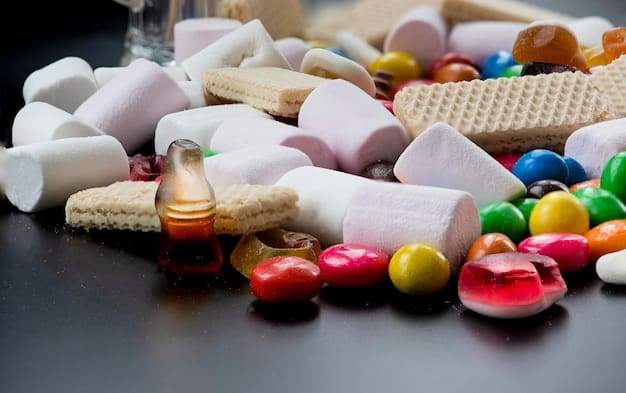Artificial Sweeteners: Are They Safe, and What Are the Best Alternatives?

Artificial sweeteners are used to reduce sugar intake but raise safety concerns; this article explores the latest research on their effects and healthy alternatives like stevia, erythritol, and monk fruit.
Are you considering cutting back on sugar but worried about the safety of artificial sweeteners? You’re not alone. This article provides the latest on artificial sweeteners: are they safe and what are the alternatives? We’ll explore recent research and healthier options to help you make informed choices.
The Debate Around Artificial Sweeteners
Artificial sweeteners have become ubiquitous in our diets, promising sweetness without the calories of sugar. However, their safety has been a topic of ongoing debate for decades. Understanding the history and reasons behind their popularity is key to evaluating their place in a healthy lifestyle.
These sugar substitutes are found in a wide array of products, from diet sodas to sugar-free candies and even some yogurts and baked goods. Their pervasive use stems from the desire to reduce calorie intake, manage blood sugar levels, and, for the food industry, to provide sweetness at a lower cost.
Why Are Artificial Sweeteners So Popular?
The allure of artificial sweeteners lies primarily in their ability to deliver sweetness without contributing significantly to calorie consumption. This makes them appealing to individuals looking to lose weight or manage conditions like diabetes that require careful control of blood sugar levels.
- Weight Management: By replacing high-calorie sugars with virtually calorie-free sweeteners, people aim to reduce their overall energy intake.
- Diabetes Control: Artificial sweeteners don’t raise blood glucose levels like sugar, offering a sweet option for those with diabetes.
- Dental Health: Unlike sugar, artificial sweeteners don’t contribute to tooth decay, making them a preferred choice in some oral care products.

What Are the Main Concerns?
Despite their benefits, concerns about the safety of artificial sweeteners persist. Studies have raised questions about potential links to various health issues, fueling the debate around their consumption.
- Gut Health: Some research suggests that artificial sweeteners may alter the gut microbiome, potentially leading to digestive issues.
- Metabolic Effects: Concerns have been raised about whether these sweeteners could interfere with the body’s natural ability to regulate blood sugar.
- Neurological Effects: Anecdotal reports and some studies suggest that certain artificial sweeteners might impact mood and cognitive function.
The debate surrounding artificial sweeteners is complex, with valid points on both sides. Navigating this landscape requires understanding the science, acknowledging the limitations of existing research, and considering individual health needs and tolerances.
Common Types of Artificial Sweeteners
With numerous artificial sweeteners available on the market, it’s essential to understand their unique properties and potential effects. Each sweetener differs in its chemical structure, level of sweetness, and how the body processes it.
From the well-known aspartame to the relatively newer stevia-derived sweeteners, each option has its own profile in terms of flavor, stability, and safety considerations. Let’s delve into some of the most common types of artificial sweeteners.
Aspartame
Aspartame is one of the most widely used artificial sweeteners, found in a variety of diet sodas, tabletop sweeteners, and processed foods. It’s approximately 200 times sweeter than sugar and has been extensively studied for its safety.
While generally regarded as safe by regulatory agencies, some individuals report adverse reactions like headaches or digestive discomfort after consuming foods containing aspartame. Those with phenylketonuria (PKU) need to avoid aspartame due to its phenylalanine content.
Sucralose
Sucralose, marketed as Splenda, is another popular artificial sweetener that is about 600 times sweeter than sugar. It’s made from sugar but undergoes a process that replaces some of its components with chlorine, making it non-caloric.
Sucralose is heat-stable, making it suitable for baking and cooking. While it’s generally considered safe, some studies have raised concerns about its potential impact on the gut microbiome.
Saccharin
Saccharin is one of the oldest artificial sweeteners, dating back to the late 19th century. It’s about 300 to 500 times sweeter than sugar and has a slightly bitter aftertaste. It was once associated with bladder cancer in rats, but subsequent research has largely debunked this link.
Saccharin is often used in combination with other artificial sweeteners to mask their individual aftertastes. It’s commonly found in tabletop sweeteners and diet beverages.

Acesulfame Potassium (Ace-K)
Acesulfame potassium, also known as Ace-K, is approximately 200 times sweeter than sugar. It is often used in combination with other artificial sweeteners because it has a slightly bitter aftertaste on its own.
Ace-K is heat-stable and commonly found in baked goods, candies, and beverages. It is not metabolized by the body and is excreted unchanged in urine.
Understanding the characteristics of each artificial sweetener can help individuals make informed choices based on their taste preferences, dietary needs, and health considerations. While these sweeteners offer calorie-free sweetness, it’s essential to assess their potential impacts on overall health and well-being.
Current Research and Findings
The scientific community continues to investigate the effects of artificial sweeteners on various aspects of health. Recent studies have shed light on potential impacts on gut health, metabolic function, and even neurological processes.
While some studies confirm the safety of artificial sweeteners within established guidelines, others raise concerns about potential adverse effects. Staying informed about the latest research is crucial for making well-informed decisions about their consumption.
Gut Microbiome Impacts
One of the primary areas of concern is the impact of artificial sweeteners on the gut microbiome, the complex community of microorganisms residing in our digestive system. Emerging research suggests that these sweeteners may disrupt the balance of gut bacteria.
Studies have shown that certain artificial sweeteners can alter the composition and function of the gut microbiome, potentially leading to digestive issues. These alterations may affect metabolic processes and immune function.
Metabolic Effects
Another area of investigation revolves around the potential metabolic effects of artificial sweeteners. Some studies suggest that consuming these sweeteners may interfere with the body’s ability to regulate blood sugar levels.
While artificial sweeteners themselves don’t raise blood glucose, some research indicates that they might affect insulin sensitivity or glucose metabolism through indirect mechanisms. This could potentially increase the risk of metabolic disorders like type 2 diabetes.
Long-Term Health Implications
Researchers are also examining the long-term health implications of regular artificial sweetener consumption. This includes assessing potential links to conditions like obesity, cardiovascular disease, and neurological disorders.
- Obesity: Some studies have reported associations between artificial sweetener use and weight gain, possibly due to compensatory eating behaviors or alterations in metabolic pathways.
- Cardiovascular Health: Research is ongoing to determine whether artificial sweeteners have any direct or indirect effects on heart health.
- Neurological Function: Some individuals report cognitive or mood-related symptoms after consuming artificial sweeteners, but more research is needed to establish clear links.
Overall, the current research landscape on artificial sweeteners is complex and evolving. While regulatory agencies generally consider these sweeteners safe within established limits, ongoing studies continue to explore potential health effects. Understanding the nuances of this research is crucial for making informed choices about incorporating artificial sweeteners into one’s diet.
Natural Alternatives to Artificial Sweeteners
For those seeking to reduce their intake of both sugar and artificial sweeteners, a range of natural alternatives are available. These options offer sweetness derived from natural sources and often come with additional health benefits.
From the ancient sweetener stevia to the more recent monk fruit extract, natural alternatives are gaining popularity as healthier ways to satisfy sweet cravings. However, it’s essential to understand their properties and potential effects on health.
Stevia
Stevia is a natural sweetener derived from the leaves of the Stevia rebaudiana plant. It’s estimated to be between 200 and 300 times sweeter than sugar, but it contains no calories or carbohydrates. Stevia has become a popular alternative due to its natural origin and potential health benefits.
- Blood Sugar Control: Stevia doesn’t raise blood sugar levels, making it a good option for people with diabetes.
- Antioxidant Properties: Stevia contains antioxidant compounds that may help protect against oxidative stress.
- Versatility: Stevia is available in various forms, including powders, liquids, and extracts, making it suitable for different uses.
Erythritol
Erythritol is a sugar alcohol that occurs naturally in some fruits and fermented foods. It contains about 70% of the sweetness of sugar but has virtually no calories or impact on blood sugar levels. Erythritol is often used in combination with other sweeteners to add bulk and improve flavor.
Unlike some other sugar alcohols, erythritol is well-tolerated by most people and is less likely to cause digestive issues. It’s absorbed by the body but not metabolized, meaning it’s excreted unchanged in urine.
Monk Fruit
Monk fruit, also known as luo han guo, is a small green fruit native to China. Its extract is about 100 to 250 times sweeter than sugar and contains no calories or carbohydrates. Monk fruit has gained popularity as a natural sweetener with a clean, sweet taste.
Monk fruit contains antioxidants and has been shown to have anti-inflammatory properties in some studies. It is also considered safe for people with diabetes as it does not raise blood sugar levels.
- Zero Calories: Monk fruit contributes no calories to the diet.
- Antioxidant-Rich: It contains compounds that may help protect against oxidative damage.
- Safe for Diabetics: Monk fruit does not affect blood sugar levels.
Other natural sweeteners include honey, maple syrup, and agave nectar. While these options are natural, they still contain calories and can impact blood sugar levels, so moderation is key. Exploring natural alternatives can help individuals reduce their sugar consumption while still enjoying sweetness in their diets.
Practical Tips for Reducing Sweetener Intake
Whether you’re looking to cut back on sugar, artificial sweeteners, or both, incorporating practical strategies into your daily life can make a significant difference. Gradual changes and mindful choices can help you reduce your sweetener intake while still enjoying flavorful and satisfying foods.
From tweaking your morning coffee routine to making smarter choices when dining out, simple steps can add up to a healthier and less sweetener-dependent lifestyle. Let’s explore some actionable tips for reducing sweetener intake.
Read Food Labels Carefully
One of the most effective ways to reduce your sweetener intake is to become a savvy label reader. Many processed foods and beverages contain hidden sugars and artificial sweeteners. By carefully examining ingredient lists and nutrition facts panels, you can make more informed choices.
Pay attention to ingredients like high fructose corn syrup, sucrose, aspartame, and sucralose, among others. Be aware that sugars can be listed under various names, so a thorough review is essential.
Choose Whole, Unprocessed Foods
Focusing on whole, unprocessed foods is another essential strategy for reducing sweetener intake. Fresh fruits, vegetables, lean proteins, and whole grains naturally contain less added sugars and artificial sweeteners.
When you cook at home using fresh ingredients, you have greater control over what goes into your meals. This allows you to adjust the sweetness level to your liking and avoid unnecessary additives.
Gradually Reduce Sweetener Use
Rather than abruptly cutting out sweeteners entirely, consider a gradual reduction approach. Slowly decreasing the amount of sugar or artificial sweetener you add to your coffee, tea, or other beverages can help you adjust your taste buds over time.
Similarly, when baking or cooking, try substituting a portion of the sugar with unsweetened applesauce, mashed bananas, or other natural alternatives. Small changes can make a big difference in the long run.
Explore Flavorful Alternatives
To satisfy your sweet cravings without relying on sweeteners, explore flavorful alternatives that add depth and complexity to your meals and snacks. Herbs, spices, citrus zest, and extracts can enhance the taste of foods and beverages naturally.
- Cinnamon: Adds warmth and sweetness to oatmeal, yogurt, and baked goods.
- Vanilla Extract: Enhances the flavor of desserts and beverages without adding sugar.
- Lemon Juice: Brightens up salads, sauces, and marinades with a tangy zest.
By experimenting with different flavors and ingredients, you can discover new ways to enjoy your food without the need for excessive sweetness. Embrace the natural flavors of whole foods and let your taste buds adapt to subtle nuances.
Conclusion: Making Informed Choices
In conclusion, navigating the world of sweeteners requires informed decision-making based on the latest research and individual health needs. While artificial sweeteners offer a calorie-free alternative to sugar, potential concerns about gut health and metabolic effects warrant careful consideration. Natural alternatives like stevia, erythritol, and monk fruit provide healthier options for satisfying sweet cravings. By reading labels, choosing whole foods, and exploring flavorful alternatives, you can reduce your sweetener intake and promote overall well-being.
| Key Point | Brief Description |
|---|---|
| 🤔 Safety Concerns | Artificial sweeteners raise questions about gut health and metabolic effects. |
| 🌿 Natural Options | Stevia, erythritol, and monk fruit offer sweetness from natural sources. |
| ✅ Mindful Choices | Reading labels and choosing whole foods help reduce overall sweetener intake. |
| 💡 Practical Tips | Gradual reduction and flavorful alternatives make it easier to cut sweeteners. |
FAQ Section
▼
Most artificial sweeteners are considered safe by regulatory agencies when consumed within acceptable daily intake levels. However, some individuals may experience side effects or have specific health conditions that warrant caution.
▼
Stevia, erythritol, and monk fruit are popular natural alternatives to sugar. They offer sweetness without the calories or impact on blood sugar levels associated with traditional sugars.
▼
Some studies suggest that certain artificial sweeteners can alter the composition and function of the gut microbiome, potentially leading to digestive issues or metabolic imbalances.
▼
Start by reading food labels carefully, choosing whole, unprocessed foods, and gradually reducing the amount of sweeteners you add to your coffee, tea, or other beverages. Explore flavorful alternatives, such as spices and herbs.
▼
While natural sweeteners may offer some nutritional benefits, they still contain calories and can impact blood sugar levels if consumed in excess. Moderation is key, regardless of whether the sweetener is natural or artificial.
Conclusion
Ultimately, the decision of whether to use artificial sweeteners or natural alternatives depends on individual preferences, health goals, and tolerance. Staying informed about the latest research and adopting a balanced approach to sweetness can contribute to a healthier lifestyle.





